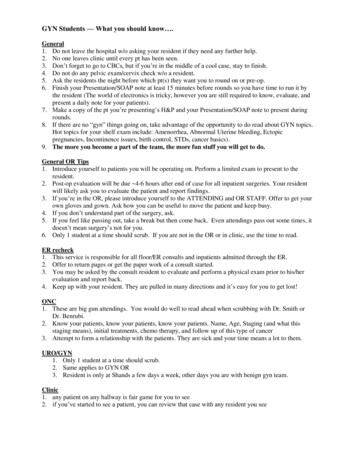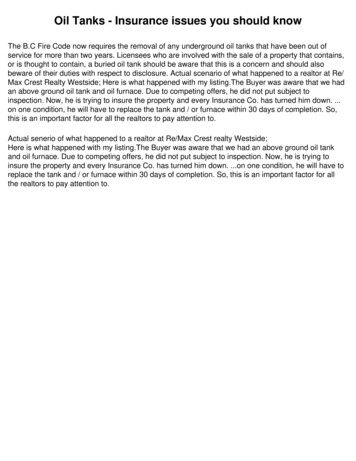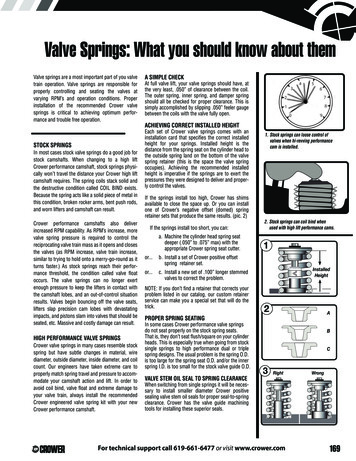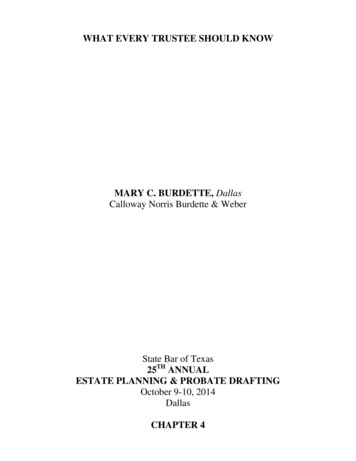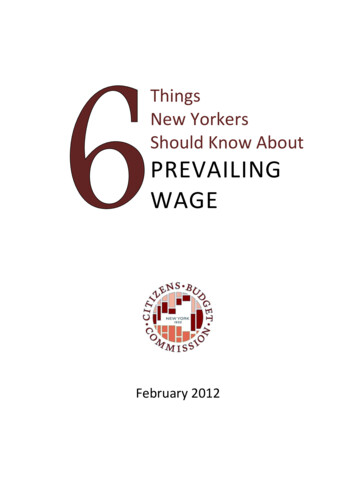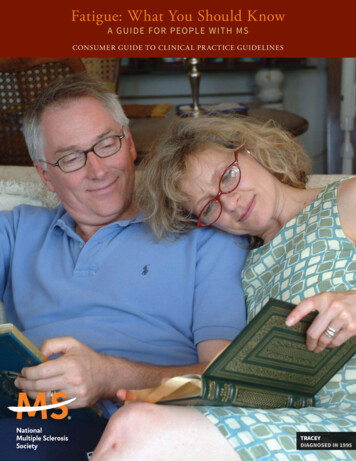
Transcription
Fatigue: What You Should KnowA GUIDE FOR PEOPLE WITH MSCONSUMER GUIDE TO CLINIC A L PR ACTICE GUIDELINESTRACEYDIAGNOSED IN 1995
Fatigue: What You Should KnowA GUIDE FOR PEOPLE WITH MSNAT IONA L MU LT IPL E SCL EROSIS SOCIET Y EDIT ION BA SED ONGU IDELINE S PU BLISHED BY MU LT IPL E SCL EROSIS COU NCIL FORCLINIC A L PR AC T ICE GU IDELINE SThis guide was originally based on Fatigue and Multiple Sclerosis: A Clinical PracticeGuideline for Professionals developed by the Multiple Sclerosis Council for ClinicalPractice Guidelines.We are deeply indebted to the staff of the Paralyzed Veterans of America who provided organizational,administrative and financial support for the development of the original guide. Paralyzed Veterans ofAmerica oversaw the preparation, production, and printing of the original book.This guide has been updated based on current research and clinical findings about MS-relatedfatigue. We recommend that you periodically review this guide with healthcare professionals fromwhom you regularly receive care.Additional information about current medications, research directions, and dealing with fatiguecan be found at nationalMSsociety.org. Search the site using the keyword “fatigue”.The information in this guide is not intended to substitute for professional medical care. If youdevelop unusual fatigue, contact a physician or other appropriate healthcare professional.Reprinted with permission from the Paralyzed Veterans of America (PVA) Consumer Guide toClinical Practice Guidelines, Fatigue: What You Should Know, A Guide for People with MultipleSclerosis. Minor updating in 2006 and 2015 by the National MS Society.Copies of this edition are available at nationalMSsociety.org or 1-800-344-4867. 2019 National MS Society. All rights reserved.
ContentsWho should read this guide?.2Why is this guide important?. .2What is MS-related fatigue?.3Are there different types of fatigue?.3What causes fatigue?.3How is non-MS fatigue treated? .4What are the types of MS-related fatigue?. .5How is MS-related fatigue treated?. .6What else helps?.7What will my insurance cover? .8Table 1: Treating breathing and movement problems. . . 10Table 2: Self-help energy boosters. . 11How does the ADA relate to fatigue at work?. . . 14What if treatment stops working? . . 14Glossary. 15Resources for people with MS. 16Appendix 1: My medications list. 18Appendix 2: My sleep habits. 19Multiple Sclerosis Council for Clinical Practice Guidelines Panel (2000). . . 21
AliciaEleven years ago I was diagnosed with MS whenmy first child was only 18 months old. After myfirst couple of horrible episodes of MS way backthen, I have been pretty lucky and have hadfew problems.Now I’m 34 years old and maintaining avery busy household with two children (theyoungest is 3 years old), a husband and a dog.Life has gone on — except for one thing. I amexhausted. I get tired so quickly and don’t seemto bounce back the way I used to. Getting to mychildren’s ball games is impossible because thesummer heat zaps me of all my energy. I don’thave the energy to keep my house as clean asit used to be. The usual routines around thehouse are falling apart and I’m sure the kidsthink I am less interested in all their activities.My husband has been very understanding,though because of my fatigue we don’t havethe same intimate relations we used to.I was desperate, so I called my doctor, who didtests and helped me with some medication formy fatigue. My doctor also referred me to anoccupational therapist. The therapist taughtme about fatigue in MS and gave me lots ofgreat ideas, like changing the householdroutines to let me rest while the kids are atschool or napping, rotating the dishwashingschedule among every one in the family, andhelpful energy-saving tips, like putting mylaundry basket on a wheeled cart. There weremany more wonderful tips, but the biggestthing I learned was not to struggle so longbefore contacting my neurologist and workingwith an occupational therapist to learn how tomanage my fatigue.I’m still working things out on how best to saveand restore my energy, but I am feeling betterand know I’m on the right track.A Guide for People with MS 1
Who shouldread this guide?Why is thisguide important? People with multiple sclerosis (MS)Fatigue is the most common symptom ofMS. As many as 75% to 95% of all peoplewith MS have fatigue; 50% to 60% saythat it’s one of their worst problems. Infact, fatigue is one of the major reasons forunemployment among people with MS. Family, friends, personal care attendants*and other care partners Healthcare professionals, includinghealthcare providers, nurses, physicaltherapists, occupational therapists,speech-language pathologists andpsychologistsNo one knows what really causes MSrelated fatigue, but we do know somethings that can help. This guide explainssome options.If lack of energy is interfering with yourregular activities or quality of life, tellyour healthcare provider. You could have anon-MS problem that can be treated. Evenif it’s related to MS, there are things you cando to improve the way you feel. Together,you and your healthcare provider can selectthe best options for you.* Words in bold are explained in the Glossary on page 15.ONE SIZE DOESN’T FIT ALLEveryone’s circumstances are different: family situation, finances, support network, communityresources, work flexibility, personal preferences, physical function. Some options may not bepractical for you. The more your healthcare team knows about these details, the better they’llbe able to help.2 Fatigue: What You Should Know
What isMS-related fatigue?Fatigue is a lack of physical energy, mentalenergy, or both. Everyone has low-energydays. And everyone knows what it’s like tobe down in the dumps and not feel likedoing much of anything.MS-related fatigue is different, and it’s notalways easy to spot. With MS fatigue, peoplehave more “off” days than “on” days. Beforeit can be identified, other possible causesneed to be crossed off the list of suspects.(See What causes fatigue? on page 3.)If you have MS, ask yourself this question:Is fatigue interfering with my everydayactivities or quality of life? If the answer isyes, your healthcare provider needs to know.Are there differenttypes of fatigue?Yes. The next step is to find out what typeyou have. This guide refers to two generaltypes of fatigue. Either type may, or maynot, have a direct association with MS: Chronic persistent fatigue: Activity-limitingsluggishness or lassitude that goes on formore than six weeks, more than 50% of thedays, during some part of the day. Acute fatigue: Activity-limitingsluggishness that has either appearedfor the first time or become noticeablyworse during the previous six weeks. Acutefatigue can be an early warning that otherMS symptoms are about to flare up orbecome worse.Think about your energy level over thepast several weeks. You may want to trackhow you feel for a couple of weeks, simplyby making notes on a calendar. Thenreview the two descriptions of fatigueabove. Which one best fits you? Tell yourhealthcare provider which type of fatigueyou think you have, and why.Each type of fatigue has different potentialcauses and treatments. All other possiblecauses need to be explored before MS relatedfatigue is considered. (See What are thetypes of MS-related fatigue? on page 5.)IMPORTANT: Pay special attentionto your MS after an episode of unusualfatigue. If your other MS symptoms seemto be getting worse, let your healthcareprovider know.What causes fatigue?Even though fatigue is common in MS, MSmay not be the reason — or the only reason— you’re tired. Many factors can cause orcontribute to fatigue. They include: Other medical conditions: Many othermedical conditions can cause fatigue,including anemia, heart disease, diabeteshyperthyroidism (overactive thyroid),hypothyroidism (underactive thyroid),among others. Even something as simpleas a minor infection can sap energy. Weather: Heat makes many people feellike overcooked pasta, and humidity canmake the effects of heat worse. Bothfacts are especially true for people withMS. Heat and humidity are measuredtogether to produce the “heat index” oftenmentioned in weather reports.A Guide for People with MS 3
Medications: Some medications cancause fatigue as a side effect. Make sureyour healthcare provider has a list of allmedications you take. (See Appendix 1,on page 18.) Sleep problems: Problems falling asleep,staying asleep, or getting the right kindof sleep (insomnia) prevent people fromfeeling refreshed when they wake up.Sleep apnea is also a very common causeof fatigue. A sleep questionnaire can helpyour healthcare provider pinpoint thecause(s) of your fatigue. (See Appendix 2,on page 19.) Stress: Stress can make anyone tired, andMS can make life more stressful. Manythings can cause stress: more demandsthan a person can meet; conflicts with otherpeople; disruptions in routine; death of aperson close to you, divorce, or other majorlosses. Even happy times such as a weddingor holiday activities can cause stress. Depression and anxiety: Difficult issues athome or at work can be emotionally andphysically draining. Depression and anxietyare common in MS. If you or others close toyou notice changes in your mood or loss ofinterest in once-favorite activities, be sureto tell your healthcare provider. Physical inactivity: Reduced activitybecause of fatigue or limited mobilitycauses the body to become deconditioned,which in turn leads to greater fatigue. Andwhen a person is deconditioned, it requiresmore effort and energy to do things, whichfurther adds to the person’s fatigue. Superhero syndrome: It’s easy to overdophysical activity if you don’t work up toit gradually. Weekend sports, gardening,housecleaning, errands, and shopping canall be draining.4 Fatigue: What You Should KnowBe prepared to discuss these subjects withyour healthcare provider. You may also beasked to complete a questionnaire called theFatigue Severity Scale that covers these areasin detail. After examining you, the healthcareprovider may order laboratory tests or referyou to a specialist for more evaluation.How is non-MSfatigue treated?The results of your examinations and testswill guide the next steps. For example: Other medical conditions can be treated byyour healthcare provider or a specialist. Hot weather and muggy climate can behandled with cooling techniques. Medications sometimes can be adjusted,changed, or stopped — but always talkwith your healthcare provider first. It canbe dangerous to make medication changeson your own. Sleep problems can have physical orpsychological causes. Special sleeptesting can identify the source and informtreatment decisions. Stress results from problems people encounterand how they cope with those problems.Reduce stress-causing aspects of your life asmuch as you can. For help in learning waysto cope with stress, see a mental healthprofessional who specializes in working withpeople who have chronic illnesses. Depression is one of the most treatablesymptoms of MS. It can be treated withantidepressant medications, problem
focused psychotherapy, or both. (Togetherthey can be more effective than eitherapproach alone.) According to recentresearch, when people with MS who arediagnosed with depression are treatedeffectively for depression, their fatiguemay be reduced.Ask your healthcare provider about afollow-up visit to find out if treatmentis improving your fatigue problems. Ashort questionnaire, such as the ModifiedFatigue Impact Scale (MFIS), may be partof this assessment. (The MFIS is availablein Fatigue and Multiple Sclerosis. Seebox.) Over a period of time, you may takethe same test several times. This tool helpsyour healthcare provider assess the effectsof treatment. If treatment isn’t working,your healthcare provider will discuss otheroptions with you.When all non-MS causes of fatigue areunder control, you may find that fatigueisn’t really a problem anymore. If it is, theculprit is likely to be related to MS.What are the types ofMS-related fatigue?Here again, there are broad categories: Fatigue related to mobility problems: WithMS, mobility problems can make ordinaryactivities require so much physicalexertion that a person is exhausted by theeffort. This is especially true for peoplewho have weakness in their arms or legs. Motor fatigue: A type of fatigue thatoccurs in muscles (most often in the legsKEEP TRACK OF YOURMEDICATIONSFor many reasons, it’s helpful to keep a listof all medications you take (see Appendix 1,on page 18). This includes: Prescription drugs Nonprescription drugs, such asaspirin, ibuprofen, and products forcolds, flu, and allergies Herbal therapies, alternative, or“natural” medicines Vitamins, minerals, and other dietarysupplements When you go to a healthcare provideroffice, bring the list with you. If yourmedications change, update the list.Your doctor can find a detailed list ofmedications that may cause fatigue inFatigue and Multiple Sclerosis.or arms) that are not receiving adequatenerve impulses due to demyelination.These muscles may tire quickly withrepeated use causing feelings of extremeweakness and recover following a periodof rest. Fatigue related to respiratory problems:MS can sometimes affect breathing, andwhen it does, even simple activities canbe tiring. This is especially true for peoplewho have the most serious physicalsymptoms of MS. Primary MS fatigue: This is a diagnosis ofelimination. After all other causes of fatiguehave been ruled out or treated successfully,primary MS fatigue is what’s left.A Guide for People with MS 5
How is MS-relatedfatigue treated?Movement and breathingproblemsYour healthcare provider will do anexamination of the way you move andbreathe. That may include checking: Your strength Your muscle coordination (any problems,including ataxia) How stiff or flexible you are (spasticity) How you walk (your gait) How you move from one position toanother (transfer), especially to or from aseat, like a wheelchair or toilet If you use a wheelchair, is it appropriate foryour current needs and abilities If you use an assistive device, is it theproper one for your current needs and areyou using it correctly If you are not using an assistive device,would a device help to increase your safetyand mobility and reduce your fatigueDepending on the results, you may be referredto an occupational therapist, physicaltherapist, or both for more evaluation.Table 1 (page 10) lists treatment optionsfor breathing and movement problemsrelated to MS. If you use any of the optionsin Table 1, your healthcare provider maywant to see you to monitor your response.6 Fatigue: What You Should KnowPrimary MS fatigueIf low energy is still a problem after all othercauses have been addressed, you probablyhave primary MS fatigue. Treatmentoptions include strategies that specialistscan teach you, and prescription drugs. Theycan be used alone or together.Table 2 (page 11) lists lifestyle changesthat have helped people with MS feel andfunction better. Various professionals canassist with these strategies. For example, anutritionist or dietitian can help with mealand snack plans; occupational and physicaltherapists can help with activity planningand exercise programs; and a therapist ornurse can help with relaxation techniques.To find out what resources are availablein your community, see Resources forPeople with MS on page 16. Yourhealthcare provider and health plan canalso provide information.For primary MS fatigue, your healthcareprovider may suggest medication.Prescription drugs for fatigue are of somehelp to some people, but they’re not a cureall, and they don’t benefit everyone.There are no prescription drugsapproved by the U.S. Food and DrugAdministration (FDA) to treat MS fatigue.Some medications used off-label for MSfatigue include amantadine (ah-man-tuhDEEN), which is only available in genericform, modafinil (moe-DAF-i-nil), andarmodafinil (ar-moe-DAF-i-nil). The brandname for modafinil is Provigil .The brandname for armodafinil is Nuvigil . Theseproducts come in pill form. Antidepressant
medications and psychostimulants mayalso be used off-label to relieve fatigue insome people. More studies are needed todemonstrate the efficacy of these fatiguemedications in MS before they couldbecome FDA approved.Most prescription drugs have possibleside effects, and some drugs shouldn’tbe mixed with others. Before you startany prescription drug, make sure yourhealthcare provider has a current list ofall other medications you’re taking. Thatincludes vitamins, minerals, and herbal ordietary products. (See Appendix 1, on page18.) Always ask your healthcare providerabout possible side effects and what to doif they occur. It’s a good idea to get thisinformation in writing and share it withfamily members and caregivers.IMPORTANT: If you’re having problemswith any medication, tell your healthcareprovider right away. Do not just stoptaking it. Some medications need to be cutback gradually before you can safely stoptaking them.What else helps?You’ve tried basic lifestyle changes (Table 2,on page 11) and maybe medication. Theyhelped, but not much. What next?It’s time to call on professionals withexpertise in adaptive equipment, energysaving adaptations, and general exercise andaerobic fitness. Occupational and physicaltherapists are trained in these areas. They’llstart with some of the same issues addressedby your healthcare provider, such as yourhistory of fatigue, how hot weather affectsyou, how you move, and what you’ve alreadytried to improve your energy. Occupationaland physical therapists will evaluate: Your general physical condition —strengths, weaknesses, and areas that canbe improved. Your environment — where you live, work,and spend time regularly, including anydevices you use to help you function. Your aerobic fitness level — howwell your heart and lungs work duringphysically demanding activities. Your strength, balance and coordination— how smoothly and safely are you able tomove around. Any mobility devices you use to help youmove around — canes, crutches, walker,wheelchair (manual or powered), scooter,ankle/foot orthotic.They can also help you fill out an ActivityDiary. By showing which activities take themost out of you, this
MS. As many as 75% to 95% of all people with MS have fatigue; 50% to 60% say that it’s one of their worst problems. In fact, fatigue is one of the major reasons for unemployment among people with MS. No one knows what really causes MS- related fatigue, but we do know som
